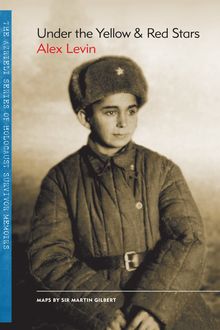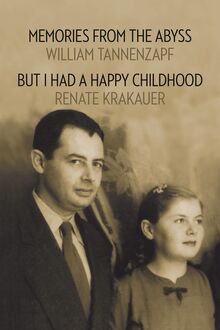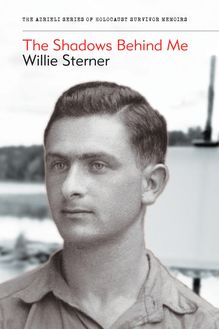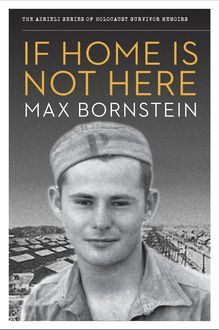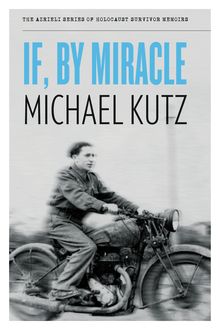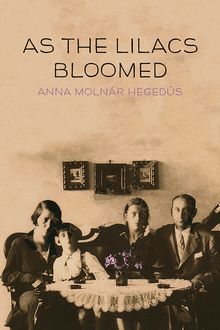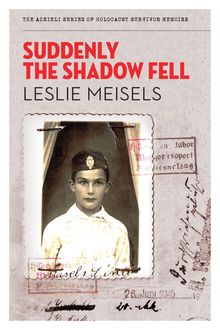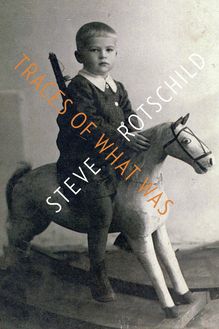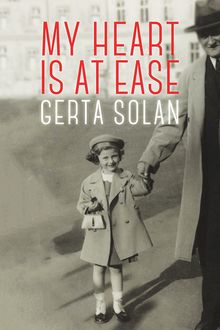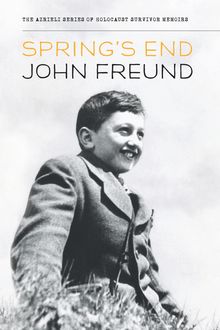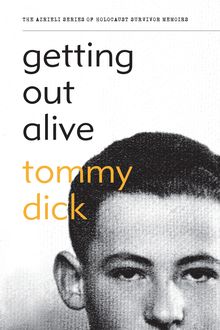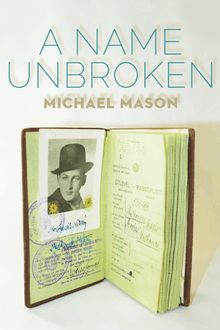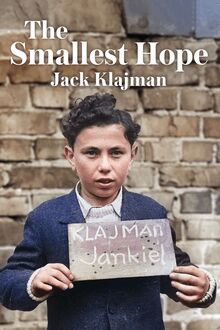-
 Univers
Univers
-
 Ebooks
Ebooks
-
 Livres audio
Livres audio
-
 Presse
Presse
-
 Podcasts
Podcasts
-
 BD
BD
-
 Documents
Documents
-
- Cours
- Révisions
- Ressources pédagogiques
- Sciences de l’éducation
- Manuels scolaires
- Langues
- Travaux de classe
- Annales de BEP
- Etudes supérieures
- Maternelle et primaire
- Fiches de lecture
- Orientation scolaire
- Méthodologie
- Corrigés de devoir
- Annales d’examens et concours
- Annales du bac
- Annales du brevet
- Rapports de stage
La lecture à portée de main
Vous pourrez modifier la taille du texte de cet ouvrage
Découvre YouScribe en t'inscrivant gratuitement
Je m'inscrisDécouvre YouScribe en t'inscrivant gratuitement
Je m'inscrisEn savoir plus
Vous pourrez modifier la taille du texte de cet ouvrage
En savoir plus

Description
Sujets
Informations
| Publié par | Azrieli Foundation |
| Date de parution | 15 septembre 2015 |
| Nombre de lectures | 2 |
| EAN13 | 9781988065168 |
| Langue | English |
| Poids de l'ouvrage | 1 Mo |
Informations légales : prix de location à la page 0,0300€. Cette information est donnée uniquement à titre indicatif conformément à la législation en vigueur.
Extrait
Stronger Together
Ibolya (Szalai) Grossman and Andy Réti
The Azrieli Series of Holocaust Survivor Memoirs
Naomi Azrieli, Publisher
Jody Spiegel, Program Director
Arielle Berger, Managing Editor
Farla Klaiman, Editor
Elizabeth Lasserre, Senior Editor, French-Language Editions
Elin Beaumont, Senior Educational Outreach and Events Coordinator
Catherine Person, Educational Outreach and Events Coordinator, Quebec and French Canada
Marc-Olivier Cloutier, Educational Outreach and Events Assistant, Quebec and French Canada
Tim MacKay, Digital Platform Manager
Elizabeth Banks, Digital Asset and Curator Archivist
Susan Roitman, Office Manager (Toronto)
Mary Mellas, Executive Assistant and Human Resources (Montreal)
Mark Goldstein, Art Director
François Blanc, Cartographer
Bruno Paradis, Layout, French-Language Editions
Contents
The Azrieli Series of Holocaust Survivor Memoirs
Series Preface: In their own words...
About the Glossary
Introduction
Map
Ibolya Grossman
Dedication
Prologue
Five Sisters
The First Scars
Zolti
The Letter
Aftermath
A Single Mother
The First Escape
Light of My Eyes
The Second Escape
A Place of Our Own
New Beginnings
Visits and Journeys
The Circle of Life
My Future
Bittersweet Budapest
Életem
Book of Tears
Epilogue
Andy Réti
Dedication
Acknowledgements
Author’s Preface
What’s in a Name?
My Formative Years
Communism and Religion
The True North
On the Move Again
Young and Carefree
Growing Up
The Quest Continues
Behind the Wheel
Two Families
The Biggest Fight
Making a Difference Together
Epilogue
Glossary
Photographs
Copyright
About the Azrieli Foundation
Also Available
Series Preface: In their own words...
In telling these stories, the writers have liberated themselves. For so many years we did not speak about it, even when we became free people living in a free society. Now, when at last we are writing about what happened to us in this dark period of history, knowing that our stories will be read and live on, it is possible for us to feel truly free. These unique historical documents put a face on what was lost, and allow readers to grasp the enormity of what happened to six million Jews – one story at a time.
David J. Azrieli, C.M., C.Q., M.Arch
Holocaust survivor and founder, The Azrieli Foundation
Since the end of World War II , over 30,000 Jewish Holocaust survivors have immigrated to Canada. Who they are, where they came from, what they experienced and how they built new lives for themselves and their families are important parts of our Canadian heritage. The Azrieli Foundation’s Holocaust Survivor Memoirs Program was established to preserve and share the memoirs written by those who survived the twentieth-century Nazi genocide of the Jews of Europe and later made their way to Canada. The program is guided by the conviction that each survivor of the Holocaust has a remarkable story to tell, and that such stories play an important role in education about tolerance and diversity.
Millions of individual stories are lost to us forever. By preserving the stories written by survivors and making them widely available to a broad audience, the Azrieli Foundation’s Holocaust Survivor Memoirs Program seeks to sustain the memory of all those who perished at the hands of hatred, abetted by indifference and apathy. The personal accounts of those who survived against all odds are as different as the people who wrote them, but all demonstrate the courage, strength, wit and luck that it took to prevail and survive in such terrible adversity. The memoirs are also moving tributes to people – strangers and friends – who risked their lives to help others, and who, through acts of kindness and decency in the darkest of moments, frequently helped the persecuted maintain faith in humanity and courage to endure. These accounts offer inspiration to all, as does the survivors’ desire to share their experiences so that new generations can learn from them.
The Holocaust Survivor Memoirs Program collects, archives and publishes these distinctive records and the print editions are available free of charge to educational institutions and Holocaust-education programs across Canada. They are also available for sale to the general public at bookstores. All revenues to the Azrieli Foundation from the sales of the Azrieli Series of Holocaust Survivor Memoirs go toward the publishing and educational work of the memoirs program.
•
The Azrieli Foundation would like to express appreciation to the following people for their invaluable efforts in producing this book: Doris Bergen, Rita Briansky, Sherry Dodson (Maracle Press), Paul Green, Therese Parent, Robert Shapiro, and Margie Wolfe & Emma Rodgers of Second Story Press.
About the Glossary
The following memoir contains a number of terms, concepts and historical references that may be unfamiliar to the reader. For information on major organizations; significant historical events and people; geographical locations; religious and cultural terms; and foreign-language words and expressions that will help give context and background to the events described in the text, please see the Glossary .
Introduction
“A true story with happiness and sadness in it.” 1
Soon after I read Ibolya Grossman’s memoir, first published in 1990 as An Ordinary Woman in Extraordinary Times , I worked up the courage to call her. On the other end of the telephone line was a modest and welcoming voice. The family consisted of two survivors – Ibi and her son, Andy – whose love for each other eclipsed any solely academic interest I might once have had in the genre of the memoir, the period of the war in Budapest and its environs, and the narration of two memoirs of the Holocaust. With Ibi’s encouragement, I came to understand my need to try to make sense of the crime of the rapid decimation of Hungary’s Jews and Roma, and I reflected on what has become a method of “understanding” now: the act of retracing steps – in this case, Ibi’s and Andy’s – through the Jewish quarter of Budapest, the former ghetto area in Pest and, eventually, the house in which they were forced to live in the Budapest ghetto until they were liberated by Soviet forces in the yard at Ak á cfa [Acacia] Street. In other words, it was my own romantic view of Hungary as homeland that was challenged, and as I struggled to speak my father’s first language, Ibi and Andy aimed only to speak mine.
In the long aftermath of World War II , Europe’s economic losses worsened: pre-war populations suffered great civilian losses; enormous military casualties; the bombardment of grand cities, the distinctive Danube bridges and multiform architecture – from Gothic to Art-Nouveau, Roman to Bauhaus, and Turkish styles to an array of synagogue architectures; and the continuing tragic devastation of Europe’s Jewish population in real numbers and in forced migrations abroad. Nowhere were these losses more palpable than in Hungary and, tragically, in the absolute final stages of the war. There, not only had the majority of Hungarian Jewry been murdered, but also its smaller Roma population, murdered in the Gypsy family camps or scattered across Europe. Hungary was an “independent” ally of Nazi Germany until March 19, 1944, the day Germany occupied Hungary. On April 5, Jews were forced to wear the yellow star. One month later, in May, mass deportations began. “Between May 15 and July 9, 1944, 437,402 Jews were deported from Hungary.” 2 The Canadian survivor Rudolf Vrba, born in Slovakia, co-author of the renowned Vrba-Wetzler report, attested to the organization of the murder of the Hungarians who would be arriving in Auschwitz from Hungary in 1944, a selection that did not, by chance, include Ibi and Andy. Vrba affirms that fewer than 5 per cent of the Hungarian deportees returned. 3
Prior to the deportations, approximately 825,000 Jews lived in Hungary; according to the 1941 census, 200,000 of these resided in Budapest proper. The Jews in Budapest were not subjected to the same en masse deportations as those residing throughout the rest of the country – they were, instead, harassed and restricted by several anti-Jewish laws; and in October 1944, at the mercy of a new fascist regime led by the Arrow Cross Party, Jews were increasingly rounded up, assaulted and murdered. On October 15, 1944, Hungary’s Regent, Admiral Miklós Horthy, had announced that Hungary was not going to war, and that “nobody had to worry.” Ibi thought this meant she could tear the yellow star off her chest. But later that day, Ferencz Szálasi and the Arrow Cross Party took over the government, intent on collaborating with the Nazis and murdering the Jewish population who remained in Budapest. In November 1944, Ibi and Andy were among thousands incarcerated in the Budapest ghetto. But they held on long enough that they were saved from deportation and death, protected by the Russians who freed them and then by the Allies who followed close on their heels.
Ibolya Szalai Grossman was an ordinary woman who lived through extraordinary times with grace, verve and joyfulness whenever possible. This she did without ignoring the past, her past, and a life that inc
-
 Univers
Univers
-
 Ebooks
Ebooks
-
 Livres audio
Livres audio
-
 Presse
Presse
-
 Podcasts
Podcasts
-
 BD
BD
-
 Documents
Documents
-
Jeunesse
-
Littérature
-
Ressources professionnelles
-
Santé et bien-être
-
Savoirs
-
Education
-
Loisirs et hobbies
-
Art, musique et cinéma
-
Actualité et débat de société
-
Jeunesse
-
Littérature
-
Ressources professionnelles
-
Santé et bien-être
-
Savoirs
-
Education
-
Loisirs et hobbies
-
Art, musique et cinéma
-
Actualité et débat de société
-
Actualités
-
Lifestyle
-
Presse jeunesse
-
Presse professionnelle
-
Pratique
-
Presse sportive
-
Presse internationale
-
Culture & Médias
-
Action et Aventures
-
Science-fiction et Fantasy
-
Société
-
Jeunesse
-
Littérature
-
Ressources professionnelles
-
Santé et bien-être
-
Savoirs
-
Education
-
Loisirs et hobbies
-
Art, musique et cinéma
-
Actualité et débat de société
- Cours
- Révisions
- Ressources pédagogiques
- Sciences de l’éducation
- Manuels scolaires
- Langues
- Travaux de classe
- Annales de BEP
- Etudes supérieures
- Maternelle et primaire
- Fiches de lecture
- Orientation scolaire
- Méthodologie
- Corrigés de devoir
- Annales d’examens et concours
- Annales du bac
- Annales du brevet
- Rapports de stage

